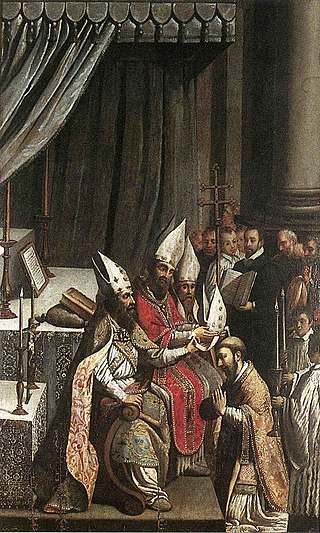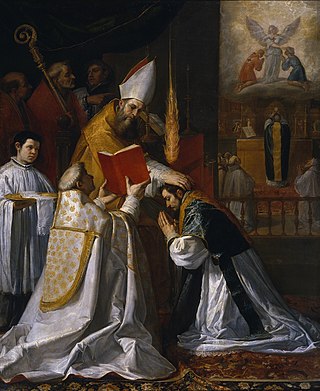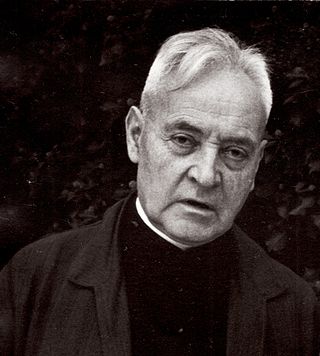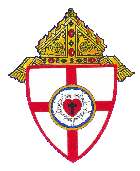Related Research Articles

Apostolic succession is the method whereby the ministry of the Christian Church is considered by some Christian denominations to be derived from the apostles by a continuous succession, which has usually been associated with a claim that the succession is through a series of bishops. Those of the Catholic, Eastern Orthodox, Scandinavian Lutheran, Anglican, Oriental Orthodox, Church of the East, Hussite, Moravian and Old Catholic traditions maintain that "a bishop cannot have regular or valid orders unless he has been consecrated in this apostolic succession". These traditions do not always consider the episcopal consecrations of all of the other traditions as valid.
A bishop is an ordained member of the clergy who is entrusted with a position of authority and oversight in a religious institution. In Christianity, bishops are normally responsible for the governance and administration of dioceses. The role or office of the bishop is called episcopacy. Organizationally, several Christian denominations utilize ecclesiastical structures that call for the position of bishops, while other denominations have dispensed with this office, seeing it as a symbol of power. Bishops have also exercised political authority within their dioceses.

An episcopal polity is a hierarchical form of church governance in which the chief local authorities are called bishops. The word "bishop" here is derived via the British Latin and Vulgar Latin term *ebiscopus/*biscopus, from the Ancient Greek ἐπίσκοπος epískopos meaning "overseer". It is the structure used by many of the major Christian Churches and denominations, such as the Catholic, Eastern Orthodox, Oriental Orthodox, Church of the East, Anabaptist, Lutheran, and Anglican churches or denominations, and other churches founded independently from these lineages. Many Methodist denominations have a form of episcopal polity known as connexionalism.

In certain Christian denominations, holy orders are the ordained ministries of bishop, priest (presbyter), and deacon, and the sacrament or rite by which candidates are ordained to those orders. Churches recognizing these orders include the Catholic Church, the Eastern Orthodox, Oriental Orthodox, Anglican, Assyrian, Old Catholic, Independent Catholic and some Lutheran churches. Except for Lutherans and some Anglicans, these churches regard ordination as a sacrament.

Ordination is the process by which individuals are consecrated, that is, set apart and elevated from the laity class to the clergy, who are thus then authorized to perform various religious rites and ceremonies. The process and ceremonies of ordination vary by religion and denomination. One who is in preparation for, or who is undergoing the process of ordination is sometimes called an ordinand. The liturgy used at an ordination is commonly found in a book known as an Ordinal which provides the ordo for celebrations.
The Evangelical Lutheran Church in America (ELCA) is a mainline Protestant Lutheran church headquartered in Chicago, Illinois. The ELCA was officially formed on January 1, 1988, by the merging of three Lutheran church bodies. As of 2022, it has approximately 2.9 million baptized members in 8,640 congregations.

Closed communion is the practice of restricting the serving of the elements of Holy Communion to those who are members in good standing of a particular church, denomination, sect, or congregation. Though the meaning of the term varies slightly in different Christian theological traditions, it generally means that a church or denomination limits participation either to members of their own church, members of their own denomination, or members of some specific class. This restriction is based on various parameters, one of which is baptism. See also intercommunion.

The Church of Iceland, officially the Evangelical Lutheran Church of Iceland, is the national church of Iceland. The church is Christian and professes the Lutheran faith. It is a member of the Lutheran World Federation, the Porvoo Communion, the Communion of Protestant Churches in Europe, and the World Council of Churches.

The Reformed Episcopal Church (REC) is an Anglican Church. It was founded in 1873 in New York City by George David Cummins, a former bishop of the Protestant Episcopal Church.

The term Evangelical Catholic is used in Lutheranism, alongside the terms Augsburg Catholic or Augustana Catholic, with those calling themselves Evangelical Catholic Lutherans or Lutherans of Evangelical Catholic churchmanship stressing the catholicity of historic Lutheranism in liturgy, beliefs, practices, and doctrines. Evangelical Catholics teach that Lutheranism at its core "is deeply and fundamentally catholic". The majority of Evangelical Catholic Lutheran clergy and parishes are members of mainstream Lutheran denominations.

High church Lutheranism is a movement that began in 20th-century Europe and emphasizes worship practices and doctrines that are similar to those found within Roman Catholicism, Eastern Orthodoxy and Anglo-Catholicism. In the more general usage of the term, it describes the general high church characteristics of Lutheranism in Nordic and Baltic countries such as Sweden, Finland, Estonia and Latvia. The mentioned countries, once a part of the Swedish Empire, have more markedly preserved Catholic traditions.
Catholicity is a concept of pertaining to beliefs and practices that are widely accepted by numerous Christian denominations, most notably by those Christian denominations that describe themselves as catholic in accordance with the Four Marks of the Church, as expressed in the Nicene Creed formulated at the First Council of Constantinople in 381: "[I believe] in one, holy, catholic, and apostolic Church." The English adjective catholic is derived from the Ancient Greek adjective καθολικός, meaning "general", "universal". Thus, "catholic" means that in the Church the wholeness of the Christian faith, full and complete, all-embracing, and with nothing lacking, is proclaimed to all people without excluding any part of the faith or any class or group of people. An early definition for what is "catholic" was summarized in what is known as the Vincentian Canon in the 5th century Commonitory: "what has been believed everywhere, always, and by all."

The Evangelical Lutheran Church of Latvia is a Lutheran Protestant church in Latvia. Latvia's Lutheran heritage dates back to the Reformation. Both the Nazi and communist regimes persecuted the church harshly before religious freedom returned to Latvia in 1988. In contrast to Estonia, where state atheism reduced the once 80% Lutheran majority to barely 10% by 2011, the Latvian Lutheran church saw its membership drop to around 20% but has recovered and now includes approximately 30% of the population. The church reports having 250,000 members according to the Lutheran World Federation.

The Evangelical Church of the Augsburg Confession in the Republic of Poland is a Lutheran denomination and the largest Protestant body in Poland with about 61,000 members and 133 parishes.
The historic or historical episcopate comprises all episcopates, that is, it is the collective body of all the bishops of a group who are in valid apostolic succession. This succession is transmitted from each bishop to their successors by the rite of Holy Orders. It is sometimes subject of episcopal genealogy.

Hermann Volk was a German cardinal of the Roman Catholic Church. He served as Bishop of Mainz from 1962 to 1982, and was elevated to the cardinalate in 1973.

Anglican interest in ecumenical dialogue can be traced back to the time of the Reformation and dialogues with both Orthodox and Lutheran churches in the sixteenth century. In the nineteenth century, with the rise of the Oxford Movement, there arose greater concern for reunion of the churches of "Catholic confession". This desire to work towards full communion with other denominations led to the development of the Chicago-Lambeth Quadrilateral, approved by the Third Lambeth Conference of 1888. The four points were stipulated as the basis for church unity, "a basis on which approach may be by God's blessing made towards Home Reunion":

The Augustana Catholic Church (ACC), formerly the Anglo-Lutheran Catholic Church (ALCC), Augustana Evangelical Catholic Church (AECC), and Evangelical Community Church-Lutheran (ECCL), is a High Church Lutheran or Evangelical Catholic denomination. Founded in 1997 by Metropolitan Archbishop Irl Allen Gladfelter, a former United States Army lieutenant colonel, the church claimed 19 congregations, 6 schools, 22 clergy, and 11,100 members altogether in 2010. Although it no longer has a presence in the United States as of 2013, the Augustana Catholic Church is active in Haiti and Ecuador, as well as in certain African countries.

In Christianity, the ordination of women has been taking place in an increasing number of Protestant and Old Catholic churches, starting in the 20th century. Since ancient times, certain churches of the Orthodox tradition, such as the Coptic Orthodox Church, have raised women to the office of deaconess. While ordination of women has been approved in many denominations, it is still a very controversial and divisive topic.
References
- ↑ Legge, Gordon (19 May 1990). "Lutherans adopt measures to help re-elected bishop". Calgary Herald .
- 1 2 3 Miller, Chris (11 April 2014). "Protestantism's 'fatal flaw' draws Lutheran to Catholic Church". The Catholic Register . Canadian Catholic News. Archived from the original on 4 March 2016. Retrieved 5 January 2016.
- ↑ "Time for a Lutheran Ordinariate?", thecatholicthing.org
- ↑ Drake, Tim (18 March 2011). "The Lutheran Landslide". National Catholic Register . Retrieved 5 January 2016.
- ↑ Olsen, Mac (16 July 2014). "Father Joseph Jacobson bids farewell to McLennan, returning to central Alberta". Smoky River Express.